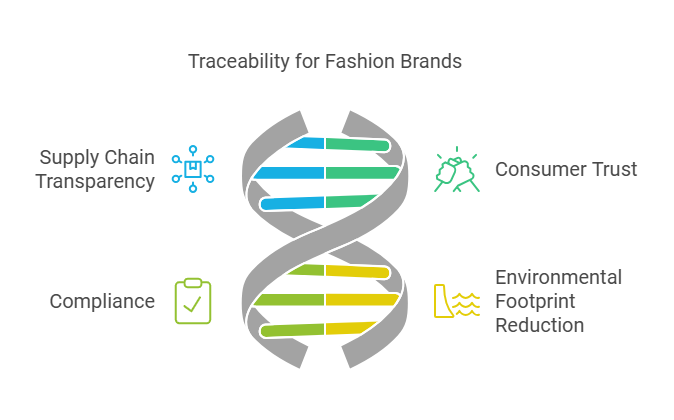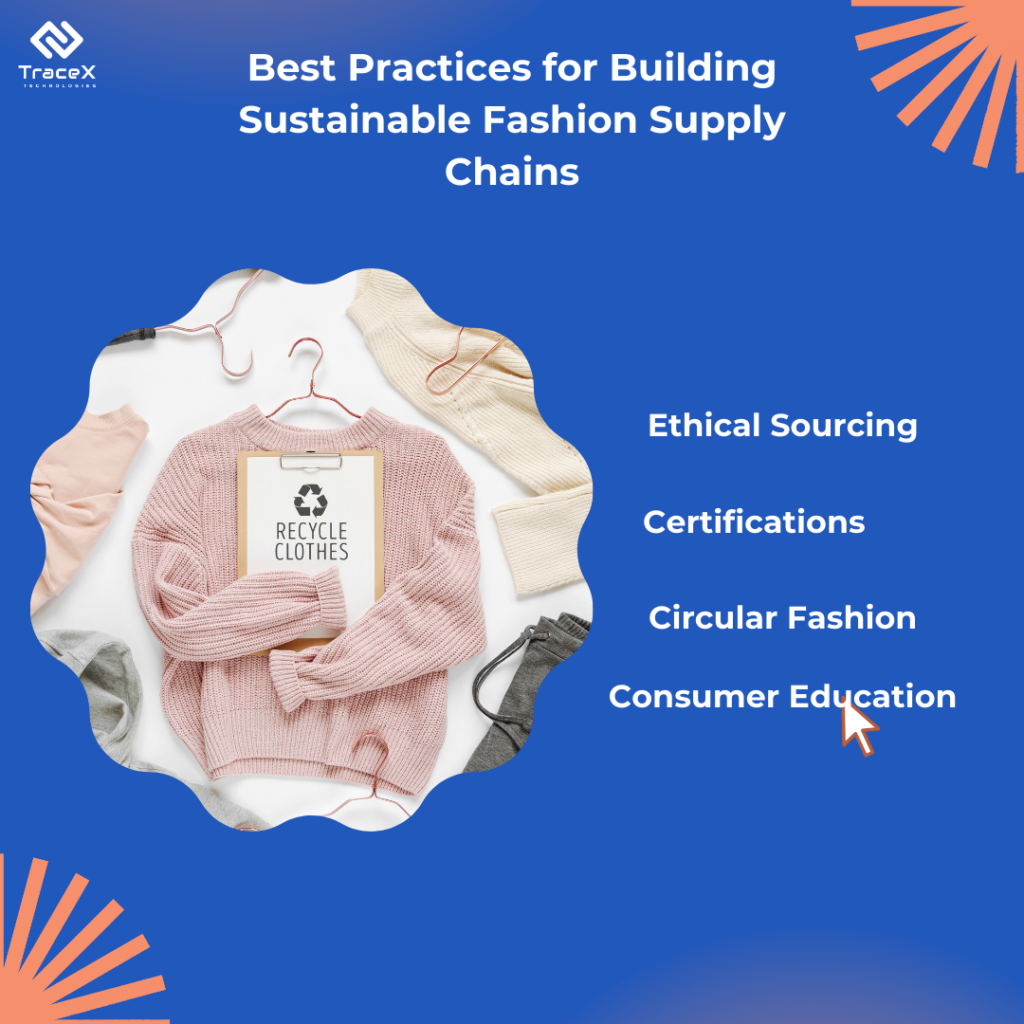Contact: +91 99725 24322 |
Menu
Menu
Quick summary: Discover how transparency and sustainability are transforming fashion supply chains. Explore challenges, technologies, and successful initiatives driving ethical and responsible practices.

The fashion supply chains we rely on are intricate and global, but they often lack transparency, creating significant challenges for brands and consumers alike. From raw material sourcing to garment manufacturing, these supply chains can obscure unethical practices such as exploitative labor and environmental harm. For instance, the journey of a single cotton shirt may span multiple countries, with each step introducing potential inefficiencies and risks.
The fashion industry contributes to 10% of global carbon emissions and consumes vast amounts of water—producing a single cotton shirt requires over 2,700 liters of water.
This lack of visibility impacts not only ethical practices but also sustainability goals, leaving brands struggling to meet consumer expectations for accountability. The pressing question is: how can we create a system that ensures both transparency and responsibility across the fashion supply chain? Innovative tools like traceability platforms and sustainable sourcing methods are emerging as the answer, offering a way to rebuild trust and protect the planet. Let’s explore the steps needed to transform the fashion supply chain into a model of accountability and sustainability.
Key Takeaways
A fashion supply chain encompasses all the stages involved in designing, producing, and delivering garments to consumers. It is a global network of interconnected processes, including raw material sourcing, textile manufacturing, garment production, distribution, and retail. Each stage involves multiple stakeholders, from farmers and factories to logistics providers and retailers.
The fashion supply chain is intricate, spanning multiple geographies and involving numerous stakeholders. While the industry thrives on innovation and creativity, it faces several pressing challenges that hinder sustainability and ethical practices.
One of the most significant issues is the lack of visibility across the supply chain. Products often pass through numerous stages, including raw material sourcing, manufacturing, and logistics, with minimal documentation or traceability. This makes it difficult for brands to:
Fashion production is resource-intensive and polluting. Key concerns include:
Unethical labor practices are prevalent, particularly in developing countries. Concerns include:
Fashion companies face increasing pressure to comply with global standards and certifications such as:
Traceability in the fashion supply chain is crucial for building transparency, accountability, and sustainability in an industry known for its complexity. It allows brands to track materials and products from their origin to the final customer, ensuring ethical sourcing, fair labor practices, and environmental responsibility. By embracing traceability, fashion companies can address issues like counterfeit goods, exploitative labor, and unsustainable practices while meeting growing consumer demand for ethical and sustainable products. Ultimately, it’s about transforming supply chains into a force for good, fostering trust among stakeholders, and paving the way for a more responsible fashion industry.
The fashion industry is rapidly embracing technology to address the many challenges it faces, from inefficiencies and resource depletion to unethical labor practices. With technology playing an increasing role in transforming fashion supply chains, several innovations are leading the charge.

Blockchain technology is revolutionizing fashion supply chains by offering a transparent and tamper-proof system. Each transaction in the supply chain can be recorded on a decentralized ledger, allowing stakeholders to trace the entire journey of a garment—from raw materials to retail shelves. This ensures authenticity, helps prevent fraud (e.g., counterfeit goods), and improves accountability across all stages of production.
The Internet of Things (IoT) has brought about smarter fashion supply chains by enabling real-time monitoring of goods and processes. Sensors, RFID tags, and connected devices collect and transmit data throughout the supply chain. These insights help track inventory, monitor the condition of goods in transit, and improve predictive maintenance in factories.
With IoT, companies can significantly reduce waste, optimize logistics, and enhance supply chain resilience. For example, clothing retailers can use IoT to monitor storage conditions for raw materials like cotton, preventing spoilage and ensuring optimal quality.
Artificial intelligence (AI) and data analytics are becoming essential tools for fashion brands. AI algorithms can analyze vast amounts of historical data to forecast trends, predict demand, and optimize inventory management. This helps companies avoid overproduction, reduce waste, and ensure they are stocking products that are in high demand.
Additionally, AI-driven insights can improve decision-making by identifying inefficiencies, improving order planning, and refining supply chain strategies. AI’s predictive capabilities also allow for quicker adaptation to market trends, which is especially crucial in the fast-moving fashion industry.
Digital platforms are providing a centralized hub for managing the entire supply chain, offering visibility across all stages of production. From design and manufacturing to distribution and retail, these platforms enable businesses to coordinate activities, collaborate with suppliers, and access real-time data on every part of the process. By integrating supply chain functions, these platforms improve efficiency, reduce errors, and enhance the collaboration needed to address sustainability challenges.

TraceX’s Sustainability Platform offers cutting-edge solutions to address the complex challenges in fashion supply chains, ensuring sustainability, transparency, and accountability.
TraceX uses blockchain technology to provide a transparent and tamper-proof record of the entire supply chain. From sourcing raw materials like sustainable cotton to manufacturing, distribution, and retail, the platform ensures complete traceability. This helps fashion brands validate claims about ethical sourcing, avoid counterfeit products, and build consumer trust.
With real-time data collection and monitoring, TraceX’s platform empowers fashion companies to track their operations efficiently. By integrating IoT and other digital tools, brands can monitor inventory levels, material conditions, and production timelines, reducing inefficiencies and waste.
TraceX simplifies compliance with global sustainability standards and regulations. The platform automates the generation of sustainability reports, ensuring alignment with certifications like Better Cotton Initiative (BCI) or Fair Trade Cotton. This helps brands meet regulatory requirements and appeal to eco-conscious consumers.
The platform facilitates transparency in labor practices by providing visibility into every stage of the supply chain. This helps identify and mitigate unethical practices, such as child labor or unsafe working conditions, ensuring compliance with ethical labor standards.
TraceX fosters collaboration between all stakeholders in the fashion supply chain, from farmers and manufacturers to retailers. The platform enables data sharing and real-time updates, ensuring seamless communication and operational efficiency.
By providing insights into resource utilization and inefficiencies, the platform helps brands adopt sustainable practices, like reducing water usage in manufacturing or optimizing logistics for lower emissions. These efforts contribute to achieving net-zero goals.
The TraceX platform is designed to scale with businesses. As fashion companies expand or diversify their product lines, the platform adapts to manage complex supply chains with multiple touchpoints.
Patagonia has been a pioneer in sustainability, emphasizing quality and reuse over fast consumption.
Stella McCartney is synonymous with ethical luxury, redefining how high-end fashion can embrace sustainability.
H&M has made strides toward sustainability despite its fast-fashion roots.
As the fashion industry grapples with challenges like environmental degradation, ethical lapses, and complex supply chain structures, traceability and sustainability emerge as indispensable solutions. By adopting innovative technologies and fostering collaboration across stakeholders, the industry can pave the way for more ethical, transparent, and resilient supply chains. Transforming fashion supply chains isn’t just a necessity—it’s an opportunity to align with global sustainability goals, win consumer trust, and create lasting impact. Together, let’s make responsible fashion the new standard.
Sustainability addresses environmental and ethical issues in fashion, ensuring long-term viability while meeting consumer demands for responsible practices.
Traceability ensures transparency by tracking materials and products across the supply chain, promoting accountability and ethical sourcing.
Brands can adopt technologies like blockchain, AI, and IoT, focus on ethical sourcing, and collaborate with transparent supply chain platforms like TraceX.
